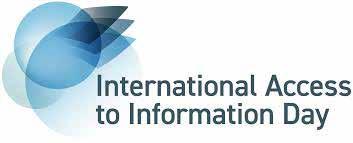
11 minute read
August
INTERNATIONAL DAYS INTERNATIONAL
DAYS SEPTEMBER
Advertisement
3rd September – National Walk to Work Day Sponsored by the Australian government and supported by all state and territory governments in this country, National Walk to Work Day involves, as the name suggests, walking to and from work but, of course, could also involve walking away from and back to your home (if you work at home) as well as any other walking activity! Health benefits of walking include: • increased cardiovascular and pulmonary (heart and lung) fitness; • reduced risk of heart disease and stroke; • improved management of conditions such as hypertension (high blood pressure), high cholesterol, joint and muscular pain or stiffness, and diabetes; • stronger bones and improved balance; • increased muscle strength and endurance; and • reduced body fat. 5th September – International Day of Charity Charity means generosity, aid and helpfulness, especially toward the needy or suffering. International Day of Charity marks the death date of Mother Teresa of Calcutta (1910-1997) who received the Nobel Peace Prize in 1979 for work undertaken in the struggle to overcome poverty and distress, which also constitute a threat to peace. Born in 1910, Mother Theresa went to India aged 18 years and thence devoted herself to helping the destitute, founded the order of Missionaries of Charity (1950) and ministered to the poor, sick, orphaned and dying, while guiding the Missionaries of Charity’s expansion, first in India and then in other countries, including hospices and homes for the poorest and homeless. The Day is to foster the implementation of charity, volunteerism and philanthropy, to alleviate the worst effects of humanitarian crises, supplement public services in health care, education, housing and child protection, and assist the advancement of culture, science, sports, and the protection of cultural and natural heritage.
7th September – National Threatened Species Day National Threatened Species Day is celebrated across Australia to raise awareness of plants and animals at risk of extinction. It marks the death date in captivity of the last known thylacine, or Tasmanian Tiger. Australia is home to more than 500,000 animal and plant species, many of which are found nowhere else in the world. Biodiversity — the variety of plants, animals, micro-organisms and ecosystems that constitute our living environment — is in decline in Australia with more than 1,700 species and ecological communities under threat and at risk of extinction due to loss, degradation and fragmentation of habitat, invasive species, altered fire regimes, unsustainable use and management of natural resources, changes to the aquatic environment and water flows, and climate change. Sadly, over the last 200 years, more than 100 animal and plant species have become extinct.
8th September – International Literacy Day As outlined by the United Nations (UN), 773 million adults and young people lack basic literacy skills and 617 million children and adolescents are not achieving minimum proficiency levels in reading and mathematics. International Literacy Day stresses the importance of literacy for individuals, communities and societies, and the need for intensified efforts towards more literate societies. A key component of the UN’s Sustainable Development Goals and the UN’s 2030 Agenda for Sustainable Development, Sustainable Development Goal 4 has, as one of its targets, ensuring all young people achieve literacy and numeracy and that adults who lack these skills are given the opportunity to acquire them. Since 1967, UNESCO International Literacy Prizes have supported effective literacy practices and encouraged the promotion of dynamic literate societies. 10th September – World Suicide Prevention Day Every 40 seconds, someone loses their life to suicide. World Suicide Prevention Day raises awareness of the scale of suicide around the world — 800,000 people annually — and the role that each of us can play to help prevent suicide. Suicide is the 15th leading cause of death globally, with a rate of 11.4 per 100,000. For every 1 suicide, 25 people have made an attempt at killing themselves. It is estimated that each suicide affects 135 people, with 108 million people bereaved by suicide worldwide every year. Depression is the most common psychiatric disorder in people who die by suicide. On this Day, take a minute to reach out to someone – a complete stranger, close family member or friend – this can change a life.
12th September – United Nations Day for South-South Cooperation The developing countries of the South-South Cooperation are located primarily in the Southern Hemisphere, and include Asia (except for Japan, Hong Kong, Macau, Singapore, South Korea and Taiwan), Central America, South America, Mexico, Africa, and the Middle East (except for Israel). These countries have contributed to more than half of the world’s growth in recent years with intra-south trade accounting for more than a quarter of all world trade, and outflows of foreign direct investment from the South representing a third of the global flows. Under the South-South Cooperation and with
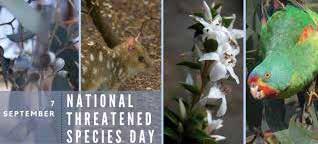
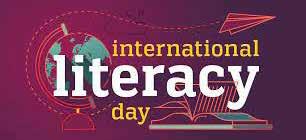
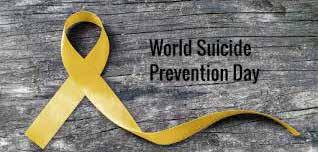
INTERNATIONAL DAYS
support from the United Nations Office for SouthSouth Cooperation (UNOSSC) these countries share knowledge, exchange technologies and form common agenda and collective actions to solve common development challenges. This unique day for South-South Cooperation is thus to support efforts to manage, design and implement SouthSouth cooperation policies and initiatives through the identification, sharing and transfer of successful Southern-generated development solutions.
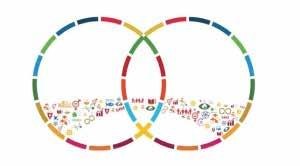
15th September – International Day of Democracy The word democracy originated from the Greek words demos meaning, whole citizen living within a particular city-state and kratos means power or rule; and this means rule by the people. For representative democracy forms of government, the people make decisions about how their community is run and elect leaders to make laws to effect these decisions. The values of freedom, respect for human rights and the principle of holding periodic and genuine elections by universal suffrage are essential elements of democracy. International Day of Democracy is thus to review the state and the ideal of democracy in the world, and to reinforce the link between democracy and human rights as captured in article 21(3) of the Universal Declaration of Human Rights: “The will of the people shall be the basis of the authority of government; this will shall be expressed in periodic and genuine elections which shall be by universal and equal suffrage and shall be held by secret vote or by equivalent free voting procedures.” 16th September – International Day for the Preservation of the Ozone Layer As explained by the National Aeronautics and Space Administration, ozone is a gas made up of three oxygen atoms (O3) that occurs naturally in the upper atmosphere — called the stratosphere and at 10-50 kilometres altitude. In the lower atmosphere (the troposphere) near the Earth’s surface, ozone is created by chemical reactions between air pollutants from vehicle exhaust, gasoline vapors and other emissions. At ground level, high concentrations of ozone are toxic to people and plants. Ozone is destroyed when it reacts with molecules containing nitrogen, hydrogen, chlorine or bromine. Though some of the molecules that destroy ozone occur naturally, people have created others. International Day for the Preservation of the Ozone Layer marks the date of the signing, in 1987, of the Montreal Protocol on Substances that Deplete the Ozone Layer (resolution 49/114) and is to protect the ozone layer by eliminating total global production and consumption of ozone-depleting substances (over 100 chemicals).
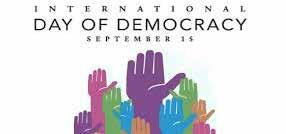
21st September – International Day of Peace International Day of Peace was established in 1981 for all humanity to commit to Peace above all differences, to contribute to building a Culture of Peace and to educate and raise public awareness on issues related to peace. For the 24 hours of this Day, non-violence and cease-fires are observed.
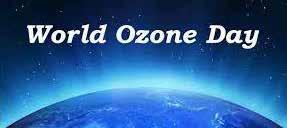
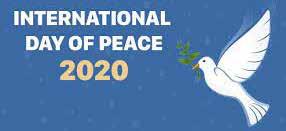
23rd September – International Day of Sign Languages The proposal for International Day of Sign Languages came from the World Federation of the Deaf (WFD) — 135 national associations representing 70 million deaf people’s human rights worldwide — and marks the date that the WFD was established in 1951 as an advocacy organisation which seeks to preserve sign languages and deaf culture as prerequisites to the realisation of the human rights of deaf people, and to raise awareness of the issues deaf people face in their everyday lives.
26th September – International Day for the Total Elimination of Nuclear Weapons The horror of the Second World War, culminating in the nuclear blasts at Hiroshima and Nagasaki, brought home the need to address the nuclear issue. However, and as outlined in the Stockholm International Peace Research Institute (SIPRI) 2020 Armaments, Disarmament and International Security yearbook, at the start of 2020, nine countries — the United States, Russia, the United Kingdom, France, China, India, Pakistan, Israel and North Korea — possessed approximately 13,400 nuclear weapons, of which 3,720 were deployed with operational forces. Approximately 1,800 of these are kept in a state of high operational alert. International Day for the Total Elimination of Nuclear Weapons, observed since 2014, is to acknowledge the threat to humanity from nuclear weapons and the necessity for their total elimination. Ploughshares Fund gives financial support to organisations and people that/ who promote the elimination of nuclear weapons, prevent the emergence of new nuclear states and build regional peace. 27th September – World Tourism Day Employment for the tourism industry is one in every ten people on Earth, and that is 100-120 million direct tourism jobs. It is a catalyst for equality and inclusivity, giving women, young people and those living in rural communities the chance to support themselves and their families and to integrate more fully into wider society. World Tourism Day fosters awareness among the global community for tourism’s social, cultural, political and economic value and the contribution the sector can make in reaching the Sustainable Development Goals. The World Tourism Organization (UNWTO) promotes tourism globally as a driver of economic growth, inclusive development and environmental sustainability and offers leadership and support to the sector in advancing knowledge and tourism policies worldwide.
28th September – World Rabies Day National Rabies is preventable. It is a viral zoonotic disease that causes progressive and fatal inflammation of the brain and spinal cord. Clinically, it is characterised by either hyperactivity and hallucinations (furious rabies) or paralysis and coma (paralytic rabies) followed by death. Though vaccines, medicines and technologies have long
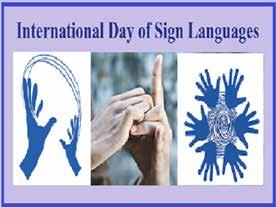
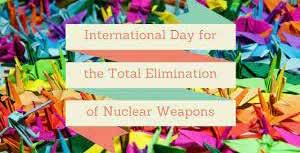
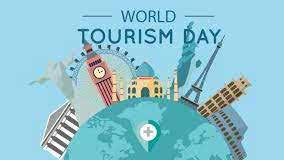
INTERNATIONAL DAYS
been available to prevent death, rabies is estimated to cause (at least) 59,000 human deaths annually in over 150 countries, with 95% of cases occurring in Africa and Asia most usually from the bite of an infected dog. Making people aware of how to avoid the bites of rabid dogs, to seek treatment when bitten and to vaccinate animals can successfully disrupt the rabies transmission cycle. World Rabies Day is to raise awareness about rabies prevention and to highlight progress in defeating this horrifying disease.
28th September – International Day for Universal Access to Information Recognising the significance of access to information, the 74th UN General Assembly proclaimed 28th September as the International Day for Universal Access to Information (IDUAI) at the UN level in October 2019. The theme of the 2021 International Day for Universal Access to Information will highlight the role of access to information laws and their implementation to build back strong institutions for the public good and sustainable development, as well as to strengthen the right to information and international cooperation in the field of implementing this human right.
30th September – International Translation Day International Translation Day pays tributes to the work of language professionals in bringing nations together, facilitating dialogue, understanding and cooperation, contributing to development and strengthening world peace and security. Transposition of a literary or scientific work, including technical work, from one language into another language, professional translation, including translation proper, interpretation and terminology, is indispensable to preserving clarity, a positive climate and productiveness in international public discourse and interpersonal communication. The Day marks the feast of St. Jerome, the patron saint of translators, who was an Italian priest who translated most of the Bible into Latin from the Greek manuscripts of the New Testament, and parts of the Hebrew Gospel into Greek.
30th September – World Maritime Day World Maritime Day is celebrated annually to provide an opportunity to focus attention on the importance of shipping and other maritime activities and to emphasise a particular aspect of the work of the International Maritime Organization (IMO). The International Maritime Organization (IMO) is responsible for the safety and security of shipping and the prevention of marine and atmospheric pollution by ships. With sustainable shipping and maritime development a priority, the IMO is developing and implementing global standards for energy efficiency, new technology and innovation, maritime education and training, maritime security, maritime traffic management and the development of the maritime infrastructure.

